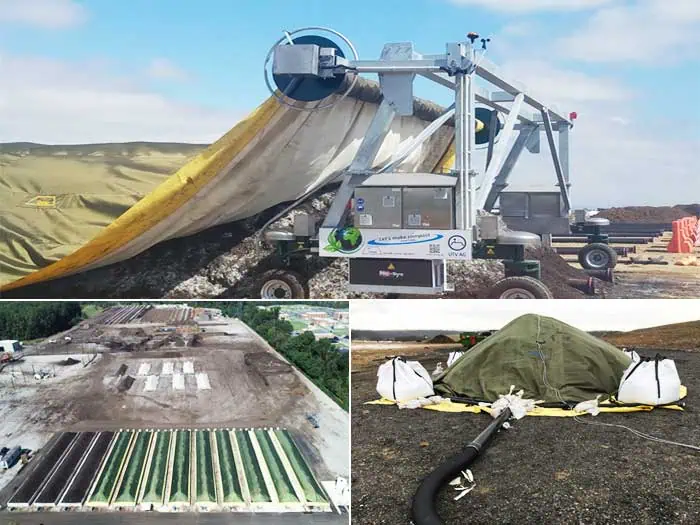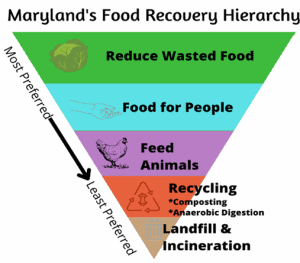


Municipalities, regions, and private companies are turning to organic composting to divert organic wastes from landfills and reuse them as feedstock for a high-quality compost by-product. While theoretically simple, there is a logical series of processes and parameters, some specific to each site, to reach the goals communities and solid waste management organizations hope to achieve.
Whether your community or region already has composting and is scaling to include food waste, or you want to establish a new composting facility or regional composting site, these free educational resources can help. The Southeastern Connecticut Regional Resources Recovery Authority’s proposed compost facility reflects a well-thought-out strategy that leverages circularity, advanced composting technologies, and engineering best practices to create a sustainable and economically viable operation.
SCRRRA’s Executive Director, David Aldridge, walks us through his proposed regional compost facility, which reflects a well-thought-out strategy that leverages advanced composting technologies and engineering practices to create a sustainable and economically viable operation. Greg McCarron, Professional Engineer, and Certified Compost Professional, discusses hybrid systems and incorporating rigorous process controls, resulting in a forward-thinking approach to composting at scale.
These free, non-commercial resources will help you appreciate and understand applying the science and practice of composting and what is critical to a successful site, design, permit, and manage composting programs that support circularity and operational efficiencies – creating value for all stakeholders.

Helpful Composting Program Resources:
Why Are So Many Municipalities Interesting in Developing a Composting Program?
The composting industry is experiencing significant growth and evolution to help reduce the amount of organic waste placed in landfills. Solid waste departments across North America feel the strain of reducing and controlling methane emissions, saving valuable landfill space, managing solid waste costs, and creating sustainable solutions.
Municipalities, regions, and private companies are turning to organic composting to divert organic wastes from landfills and reuse them as feedstock for a high-quality compost by-product. While theoretically simple, there is a logical series of processes and parameters, some specific to each site, to reach the goals communities and solid waste management organizations hope to achieve.
Whether your community or region already has composting and is scaling to include food waste, or you want to establish a new composting facility or regional composting site, a free educational session entitled Design, Siting, & Permitting of a Municipal Compost Facility can help.
The Southeastern Connecticut Regional Resources Recovery Authority’s proposed compost facility reflects a well-thought-out strategy that leverages circularity, advanced composting technologies, and engineering best practices to create a sustainable and economically viable operation.
SCRRRA’s Executive Director, David Aldridge, walks us through his proposed regional compost facility, which reflects a well-thought-out strategy that leverages advanced composting technologies and engineering practices to create a sustainable and economically viable operation.
Dave with Greg McCarron, Professional Engineer, and Certified Compost Professional, discuss hybrid systems and incorporating rigorous process controls, resulting in a forward-thinking approach to composting at scale. Greg is available to answer questions about your program or starting a pilot program after viewing the webinar.
Participants and viewers will appreciate and understand applying the science and practice of composting and what is critical to successful site, design, permit, and manage composting programs that support circularity and operational efficiencies – creating value for all stakeholders.
Our experts field your questions during the live session, and we’ve captured the Q&A at the end of the presentation. SCS never shares or sells any contact information.
Learn More About Design, Siting, & Permitting of a Municipal Compost Facility
Helpful Composting Program Resources:

The composting industry is experiencing significant growth and evolution to help reduce the amount of organic waste placed in landfills. Solid waste departments across North America feel the strain of reducing and controlling methane emissions, saving valuable landfill space, and creating sustainable solutions.
Municipalities, regions, and private companies are turning to organic composting to divert organic wastes from landfills and reuse them as feedstock for a high-quality compost by-product. While theoretically simple, there is a logical series of processes and parameters, some specific to each site, to reach the goals communities and solid waste management organizations hope to achieve.
Whether your community or region already has composting and is scaling to include food waste, or you want to establish a new composting facility or regional composting site, a free educational session entitled Design, Siting, & Permitting of a Municipal Compost Facility can help.
The Southeastern Connecticut Regional Resources Recovery Authority’s proposed compost facility reflects a well-thought-out strategy that leverages circularity, advanced composting technologies, and engineering best practices to create a sustainable and economically viable operation.
SCRRRA’s Executive Director, David Aldridge, walks us through his proposed regional compost facility, which reflects a well-thought-out strategy that leverages advanced composting technologies and engineering practices to create a sustainable and economically viable operation.
Dave with Greg McCarron, Professional Engineer, and Certified Compost Professional, discuss hybrid systems and incorporating rigorous process controls, resulting in a forward-thinking approach to composting at scale.
Participants and viewers will appreciate and understand applying the science and practice of composting and what is critical to successful site, design, permit, and manage composting programs that support circularity and operational efficiencies – creating value for all stakeholders.
Our experts will field your questions during the live session, and we offer the ability to ask questions anonymously if you prefer. We ask that you register, but SCS never shares or sells any contact information.
Learn More About Design, Siting, & Permitting of a Municipal Compost Facility
Organics diversion is a hot topic, highlighting the need for more recycling to help communities benefit from methane emission reductions and decarbonization. Methane emissions from organic waste, such as food and plants, are largely preventable and comprise a significant portion of the U.S. waste stream. That makes actions to reduce these emissions popular, such as diverting waste from landfills, establishing recycling and composting programs, and energy recovery from organic materials – they create social and economic opportunities. At the same time, the programs make significant progress toward climate action goals.
Federal Grant Funding
The U.S. government has grant funding available to assist state and local government and non-profit organizations in increasing organic diversion. Currently, several agencies and departments have grants available. These are the U.S. Environmental Protection Agency (EPA), the U.S. Department of Agriculture (USDA), and the U.S. Department of Energy (DOE).
Finding the Right Grant
ReFED has partnered with the Natural Resources Defense Council to develop a Federal Grants Database to provide a centralized place to identify funding. The Resources and Guides | ReFED database provides the grant name, the agency, a description, the deadlines, the eligibility, a link to the grant, and other useful information.
EPA’s current grant programs are:
At least eight of the SWIFR grants are organics-related, and the communities that are taking advantage of them are as follows:
More details on each of these projects are here.
EPA also has the Climate Pollution Reduction Grants that the states and other regional authorities will administer. The states and regional authorities are developing their implementation plans for these grants. SCS Engineers expects food scrap and composting projects to be some of the many projects eligible for these grants.
DOE has two grant programs:
USDA has several grant opportunities related to food waste, including:
In January, the USDA announced an investment of approximately $11.5 million in 38 cooperative agreements that support innovative, scalable waste management plans to reduce and divert food waste from landfills. The Composting and Food Waste Reduction cooperative agreements, which the American Rescue Plan Act funds, are part of USDA’s broad support for urban agriculture.
Among the projects, the Southeastern Connecticut Regional Resources Recovery Authority proposes to construct and operate southeastern Connecticut’s first and only commercial-scale food waste composting facility, creating the necessary infrastructure to divert the region’s organic material from the municipal solid waste stream, generate a local source of high-quality compost, and increase awareness of the importance of food waste reduction and recycling. SCS assisted with the design and permitting of this project.
The USDA’s Fertilizer Production Expansion Program (FPEP) provides grants to help eligible applicants increase or expand the manufacturing and processing of fertilizer and nutrient alternatives in the United States. The Compost Crew in Maryland has received tentative notice of funding for a new compost facility. SCS assisted with the design of this project.
For States and Communities Getting Started
Historically, feasibility studies and pilot programs make excellent first steps toward decarbonization, recycling, composting, and zero waste programs. Many states and communities start with waste composition and feasibility studies or pilot programs.
Truly sustainable programs balance economic, environmental, and social factors to ensure they work long-term and comply with grant terms. These services are available from reputable sustainable materials management engineers and consultants who understand all aspects of solid waste management and federal and local air, water, and soil regulations.
Additional Resources:

The U.S. Environmental Protection Agency released two new reports quantifying methane emissions from landfilled food waste and updating recommendations for managing wasted food. In a press release, EPA Administrator Michael S. Regan said, “These reports provide decision-makers with important data on the climate impacts of food waste through landfill methane emissions and highlight the urgent need to keep food out of landfills.”
The reports’ findings emphasize the importance of reducing the amount of this type of waste and managing its disposal in more environmentally friendly ways. Based on these findings, EPA is releasing an update to its Food Recovery Hierarchy to help decision-makers, such as state and local governments, understand the best options for managing the waste regarding environmental impacts.
The release of the new ranking – the Wasted Food Scale – marks the first update since the 1990s, reflecting more recent technological advances and changes in operational practices. EPA’s research confirms that preventing food from being wasted in the first place, or source reduction, is still the most environmentally beneficial approach. Evidence in these reports suggests that efforts should focus on ensuring less food is wasted to divert it from landfills, which will reduce environmental impacts.
The research announced on Thursday, October 19, represents the first time EPA has quantified methane emissions from landfilling. This work published modeled estimates of annual methane emissions released into the atmosphere from landfilled food waste, giving a cost of landfilling the waste in terms of the impact on climate change.
EPA analyzed to estimate annual methane emissions from landfilled this type of waste from 1990 to 2020 and found that while total emissions from municipal solid waste (MSW) landfills are decreasing, methane emissions from landfilled food waste are increasing. These estimates indicate that diverting edible and non-edible food from landfills effectively reduces methane emissions, a powerful greenhouse gas, from MSW landfills.
“From Field to Bin: The Environmental Impacts of U.S. Food Waste Management Pathways,” which examines the environmental impacts of disposing of food waste. This report synthesizes the latest science on the environmental impacts of how food waste is commonly managed in the U.S. This report completes the analysis that began in the 2021 companion report, “From Farm to Kitchen: The Environmental Impacts of U.S. Food Waste,” which analyzed the environmental footprint of food waste in the farm to the consumer supply chain.
“Quantifying Methane Emissions from Landfilled Food Waste” represents the first time the EPA has published modeled estimates of annual methane emissions released into the atmosphere from landfilled food waste. More food reaches MSW landfills than any other material, but its contribution to landfill methane emissions has not been previously quantified.
SCS Engineers is a proud sponsor of the New Mexico Recycling & Solid Waste Conference, September 19-20, at the Sheraton Albuquerque Uptown.
The conference, themed “The Value of Materials & Relationships,” will include plenary sessions, breakout sessions, an awards ceremony, exhibitors, networking opportunities and more! The conference is jointly hosted by The New Mexico Recycling Coalition and the New Mexico SWANA Roadrunner Chapter, and will cover such topics as recycling, composting, landfill operations, transfer stations, and much more!
SCS professionals are presenting at the conference, including
Find out more and register today!
We hope to see you there!
The Maryland Department of the Environment (MDE) reminded all stakeholders that enforcing the state’s new food diversion regulations begins April 1, 2023. The law governing these regulations, entitled “Solid Waste Management – Organics Recycling and Waste Diversion – Food Waste,” was enacted on January 1, 2023.
Diversion reduces waste at final disposal sites, such as landfills and incinerators. Food residuals include edible and nonedible materials derived from pre- and post-consumer vegetables, fruits, grains, dairy products, and meats.
A facility must implement food diversion techniques if it generates at least two tons of food residuals per week. Affected facilities include businesses, public and private schools, supermarkets, and government-run cafeterias.
SCS Engineers advises facility owners and operators to review MDE’S Determination of Applicability to determine if they are subject to enforcement. MDE strongly recommends that facility owners and operators submit a Waiver Application Form if they believe they are not subject to enforcement or cannot comply with the regulations.

Maryland generates an estimated 1.86 million tons of compostable materials and 927,926 tons of food waste annually. Although a major waste component, only a small amount is reused or recycled. What remains ends up being disposed of in landfills or incinerated. Diverting edible foods can help address the 1 in 8 (12.5%) food-insecure Marylanders. Preventing food scrap and organics disposal using methods such as composting or donating to those in need conserves energy and resources, and reduces greenhouse gas emissions.
Hear from SCS Engineers experts at the ninth Global Waste Management Symposium in Indian Wells, California, February 25-28, 2024. SCS is also is a Silver Sponsor of the conference.
The GWMS serves as a forum to discuss applied and fundamental research, case studies and policy analysis on solid waste and materials management. The community of researchers, engineers, designers, academicians, students, facility owners and operators, regulators and policymakers will participate.
Numerous SCS Engineers experts will be on hand to discuss your solid waste management challenges, and several are presenting at the symposium, including:
The Environmental Research & Education Foundation (EREF) is a strategic partner of the symposium.
Click here for schedule, registration, and other conference details
Hope to see you there!
Applying the Lessons Learned – 1383 Compliance to your composting and food recovery planning can help make your program more sustainable.
SCS Engineers developed an SB 1383 Roadmap, which we customized for each municipality. The Roadmap outlines the requirements of SB 1383 by topic and by the responsible party. The Roadmap helped municipalities to plan for SB 1383 compliance, including a schedule for implementation, monitoring, reporting, and enforcement. Because SB 1383 is not only the responsibility of the Solid Waste Department, the Roadmap outlines the responsibilities of other municipal departments, including Administration, Finance, Purchasing, Fleet, Parks, etc.
SB 1383 requires the completion of capacity studies for organic waste recycling and edible food recovery. The Organic Waste Recycling capacity planning includes collecting data on the amount of organic waste (in tons) that will be disposed of, the amounts in tons of existing organic waste recycling infrastructure, both within and outside the county, that is available, and the amount of new or expanded capacity that will be needed to process the organic waste identified as being disposed of.
For the edible food recovery capacity planning, the counties had to estimate the amount of edible food that would be disposed of by commercial edible food generators, the existing capacity for food recovery organizations available in the County, the proposed or expanded food recovery organization that will be used to recover the edible food generated, and the new or expanded capacity that is necessary to recover the edible food that is generated.
It is a challenge for municipalities to meet these requirements, but feasible and sustainable using the SB 1383 Roadmap. Learn more on Wednesday, January 25, 2023, at the USCC Compost 2023 conference. During Session D1, the California Track Regulatory Trends and Experience at 8:15 – 9:45 am, Srividhya Viswanathan and Michelle Leonard discuss the Lessons Learned – 1383 Compliance, much of which is applicable for many evolving programs nationwide.
Recently, Waste360 published “Organics Diversion Drives Changes in Landfill Operators’ Roles,” an article examining the evolving role of landfill operators in organics waste diversion. Five industry leaders provide insight into how landfill operators and the solid waste industry are adapting to accommodate the evolution and the cost of organics management.
Waste360 interviewed:
The article provides best practices, strategies, technology, and systems that could support or supplement landfill operators’ response plans to the changing policies and contract requirements in more economically sustainable ways. Waste360 rounds up answers to the most common challenges operators and public works departments face including how to reduce permitting time, cost, and environmental impact.